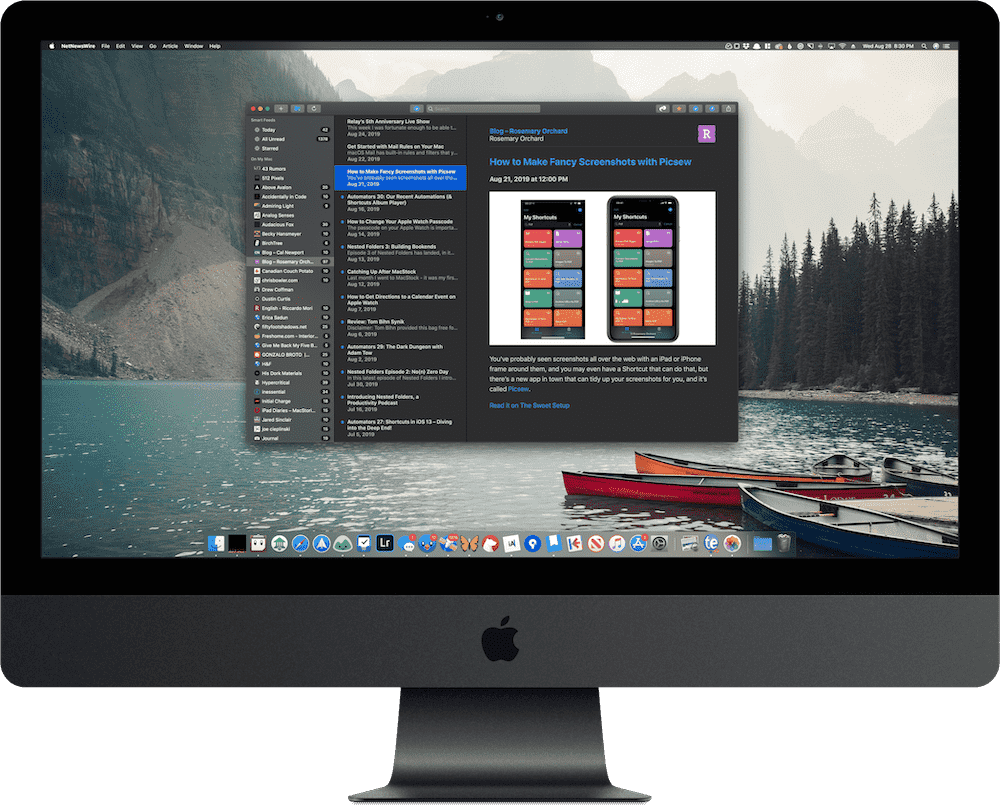
- #Netnewswire browser mobile software
- #Netnewswire browser mobile password
- #Netnewswire browser mobile download
That’s when I discovered that the RSS provider FeedBin offers an email-to-RSS interface for its subscribers. And some of my newsletters don’t offer an RSS interface of any kind. And the Substack web template is perfectly pleasant.īut I really wanted to read my newsletters in the NetNewsWire interface without an extra tap.
#Netnewswire browser mobile password
NetNewsWire’s built-in browser remembers your login, so you only have to enter your user name and password once. Unfortunately, newsletters hosted at Substack (such as Cup of Coffee and Platformer) do not-there’s just a simple summary and then you have to tap through. Ben Thompson’s Stratechery provides a custom RSS feed to subscribers, and works perfectly. It turns out that I could, though only a few of my newsletter subscriptions allow me to actually read the newsletter in the app. Could I read my newsletter in my RSS reader? Since the revival of NetNewsWire I’ve been slowly introducing RSS reading back into my daily routine, generally in the morning when I’m reading all those other things. The result of that approach was that I stopped reading most of my newsletters most of the time.īut then I found a solution that worked for me, and so maybe it’ll work for you. Which I can do, yes, but it requires me to remember to seek them out every morning and becomes a chore. The most obvious one is to log in to the various websites where the newsletters reside, visit them in Safari, and read them there. There are a few solutions for this problem. I just… don’t want to read them in email. I like the ones I subscribe to very much. Here’s an app that I never want to open first thing in the morning and use for a pleasant reading experience: Mail. Here’s a list of apps that I enjoy opening in the morning and using for reading: Slack, Safari, NetNewsWire, and various newspaper apps. One of the benefits of working at home is that I can spend my morning drinking tea, eating breakfast, and reading-reading newspapers, the web, social media, and those newsletters that I pay for. Like many people in 2021, I suddenly find myself a paying subscriber to a bunch of email newsletters. The California Sun newsletter, forwarded to NetNewsWire. This is to cover the yearly fees that app stores impose on developers.Note: This story has not been updated since 2021.
#Netnewswire browser mobile download
You can download and compile it from the source yourself, but if you get it from one of the app stores - there is going to be a small fee attached to the app. The Lite version is built on the back of Flutter and has almost all the same features as the Desktop version.

Additionally, Fluent Reader supports syncing with external services like Feedbin, Inoreader, and others.įluent Reader does have a mobile version, also. One of the key features for me was the ability to import OPML files from other services, thus saving me time from needing to reenter feeds manually. It's also built with a familiar stack Electron, React, and Fluent UI. And because it has a clean UI with some nifty features (privacy-friendly) - it's easily my top pick.
#Netnewswire browser mobile software
In most cases, if you don't start monitoring tens of thousands of feeds at once - a free plan should suffice for basic needs.Īs I spend so much time on my Desktop anyway - I don't mind using standalone software such as Fluent Reader. The list includes crowd favorites like Vercel, Netlify, and others.

One last thing, if you decide to use one of the self-hosted solutions and don't want to host it on your own device - I have compiled a separate article on free hosting solutions for developers. If you're working on an open-source RSS reader and it's not on this list - feel free to ping me on Twitter or email me, and I'll see what I can do. I'm also going to talk about a few open-source projects that you can fork yourself and implement new features as needed. The advantage of a Browser-based RSS reader is that you can also use it on your mobile device. I've put together a varied mix of both Browser and Desktop-based readers. The goal of this blog post then is to provide a concise list of free-to-use RSS readers. That said, this post is focused primarily on free software, with a few exceptions where appropriate. On top of that, many popular (premium) RSS Readers provide additional features included in the cost. What's the deal with RSS readers charging money, anyway? The most simple answer to this question is that fetching RSS feeds all day long for thousands of users has a significant cost in terms of data storage and server capabilities. And if you think you can keep up with 100+ content feeds with only social media or a bookmarking site - you're sorely mistaken. Even if a blog/website/publisher doesn't have an RSS feed ( very unlikely) - you can use something like The RSS Bridge to generate one.


 0 kommentar(er)
0 kommentar(er)
